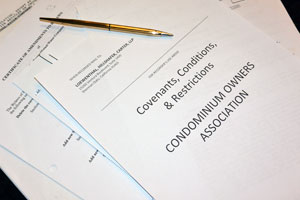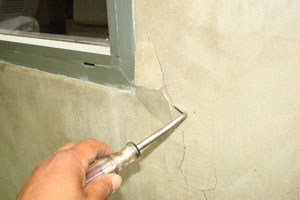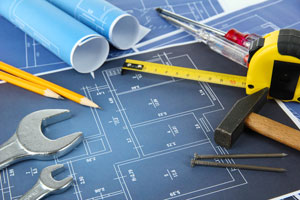LHC Newsletter Vol. 14, No.1
Contact us Toll-Free: 1-866-474-5529 (info@lhclawyers.net)
By: Robert D. Hillshafer, Esq.
David A. Loewenthal, Esq.
Barbara A. Higgins, Esq.
2022 Year-End Review of California Legislation and Cases which affect Community and Homeowners’ Associations
NEW LAWS EFFECTIVE JANUARY 1, 2023
AB 1410. Common Interest Developments
[Status: Approved by Governor and Chaptered by the Secretary of State on 9/30/22.]
This new law is probably the most significant in terms of impacting a community’s governing documents (CC&Rs, By-laws, Rules & Regulations) and their enforcement when it comes to freedom of expression and an owner’s ability to rent or lease a portion of their separate interest or unit for more than thirty (30) days.
Under newly amended Civil Code Section 4515, the governing documents shall not prohibit a member or resident from (1) peacefully assembling or meeting with invited others to discuss matters relating to the development, Association elections, legislation, election to public office, referendums or recalls; (2) inviting public officials, candidates, or representatives of HOAs to speak or meet with members, residents, and guests on matters of public interest; (3) using the common areas (including recreation hall or clubhouse) or a separate interest (with owner’s approval) for an assembly or meeting when otherwise not in use; or (4) canvassing and petitioning the members, Association Board, and residents for purposes of the above in a reasonable manner during reasonable hours; (5) distributing or circulating information about the above subjects and issues of concern in a reasonable manner during reasonable hours; or (6) using social media or other online resources to discuss any of the above, even if it is critical of the association or its governance. The bill prohibits an Association from retaliating against a member or resident for exercising certain rights, including the right to peacefully assemble or to use social media or other online resources to discuss certain issues. However, this law does not require an Association to provide social media or other online resources to the members, or to allow members to post content on the Association’s internet website. No deposits or fees or insurance are required to be paid by members or residents for use of the common areas for the activities described above.
Per the California Legislative Information website, this law will also add Civil Code Section 4739 to protect the owner from any provision in the governing documents that prohibits the rental or leasing of a portion of an owner–occupied separate interest to a renter, lessee, boarder, or tenant for a period of more than 30 days.
Civil Code Section 5875 is an addition under this bill which states in essence that an Association shall not pursue an enforcement action for violations of the governing documents during a declared emergency, if that emergency made it unsafe or impossible for the homeowner to prevent or fix the violation, except for those actions relating to the homeowner’s nonpayment of assessments or collection of delinquent assessments.
[AB 1410 amends Civil Code Section 4515 and adds Sections 4739 and 5875 to the Civil Code.]
AB 1738. Building Standards: installation of electric vehicle charging stations: existing buildings. [Approved by the Governor and Chaptered by the Secretary of State on 9/28/22].
In order to reduce California greenhouse gas emissions and commencing with the next triennial (every 3 years’) edition of the California Building Standards Code, this bill requires the Department of Housing and Community Development and Building Standards Commission to research, develop, authorize, and propose for adoption, mandatory building standards for the installation of electric vehicle charging stations with low power level 2 or higher electric vehicle chargers in existing multifamily dwellings, hotels, motels, and nonresidential development during certain retrofits, additions, and alterations to existing parking facilities, as specified.
This bill would require the Department of Housing and Community Development and the Commission to review those building standards every triennial code cycle and update those building standards until specified goals are met, as specified.
[AB 1738 adds Health & Safety Code Section 18941.11 which will be repealed on 01/01/2033.]
AB 916. Zoning: bedroom addition.
[Approved by the Governor and Chaptered by the Secretary of State on 9/28/22].
This bill prohibits a city or county legislative body from adopting or enforcing an ordinance requiring a public hearing as a condition of reconfiguring existing space to increase the bedroom count within an existing dwelling unit. The bill applies only to a permit application for no more than 2 additional bedrooms within an existing dwelling unit. The bill does not prohibit a local agency from requiring a public hearing for a proposed project that would increase the number of dwelling units within an existing structure.
[AB 916 adds Section 65850.02 to the Government Code, relating to housing.]
SB 392. Document Delivery – Common Interest Developments.
[Although approved by Governor and Chaptered by the Secretary of State back on 10/07/21, this bill did not go into effect until January 1, 2023, so this serves as an important reminder.]
This bill modifies the rules regarding notices and delivery of same. It requires, among other things, that the Association deliver those documents in accordance with the “preferred delivery method” specified by the member. This newer law requires an owner to provide to the Association, the member’s preferred delivery method for receiving notices from the Association, including the address(es) to which notices from the Association are to be delivered, an alternative or secondary notice, and the Association must include the option to the owner of receiving their notices by valid email, mail delivery, or both. If the owner does not provide a preferred method, then delivery is by traditional mail. Notices subject to general delivery are to be printed and posted in a prominent location such as a newsletter, and now includes the Association’s website, if any.
[SB 392 amends Sections 4041, 4045, 4055, 5200, 5220, 5230, 5260, 5310, and 5320 of, and amends, adds to, and repeals parts of Section 4040 of, the Civil Code, relating to common interest developments.]
SB 897. Accessory dwelling units: junior accessory dwelling units (“ADUs”).
[Approved by the Governor and Chaptered by the Secretary of State on September 28, 2022.]
The bill prohibits a local agency from denying an application for a permit to create an ADU because of non-conforming zoning conditions, building code violations, or unpermitted structures that do not present a threat to public health and safety and are not affected by the construction of the ADU. California seeks to encourage the funding, construction, and maintenance of ADUs based on an “objective” standard.
The local agency is now empowered to review and issue a demolition permit for a detached garage that is to be replaced by an ADU at the same time it reviews and issues the permit for the ADU.
The maximum height limitations applicable to an ADU are now increased to 18 feet and that is deemed a ministerial decision by a local agency if the ADU is within a half mile walking distance of a major transit stop… or if the ADU is detached on a lot that has an existing multi-family, multi-story dwelling. This bill increases the height maximum to 25 feet if the ADU is attached to a primary dwelling, except as specified, and this is also a ministerial decision. Local agencies are now prohibited from imposing any parking standards on an ADU that is included in an application to create a new single-family dwelling unit or a new multifamily dwelling on the same lot, provided that the ADU meets other specified requirements. There are multiple other changes in the existing laws regulating ADUs and Junior ADUs, which essentially relax the requirements and standards for their construction and maintenance. (Note: Civil Code Section 4751 still allows an Association to enforce reasonable restrictions which do not unreasonably increase the cost to construct or effectively prohibit construction of an ADU or JADU.)
[SB 897 amends Government Code Section 65852.22 to add Section 65852.23, and to amend Section 17980.12 of the Health & Safety Code. It also repeals and amends Section 65852.2 of the Government Code.]
2022 LEGAL UPDATE RE COLLECTION OF ROUTINE HOA ASSESSMENTS
According to the Department of Financial Protection & Innovation (“DFPI”), “routine HOA assessments” do not constitute a “consumer credit transaction” as defined under the California Debt Collection Licensing Act (“DCLA”). In sum, the collection of routine HOA assessments is not considered a collection of a “consumer debt”. Although the DFPI does not define what encompasses a “routine HOA assessment”, the commentary on its website (in a question/answer section about routine HOA assessments) reiterated that such assessments do not constitute “consumer debt” or a “consumer credit transaction”. This next-step conclusion that the collection of routine HOA assessments does not require a license because it is not considered to be a “consumer credit transaction” was also supported in the past by the 2021 federal case of Dickson v. Century Park East Homeowners Association, 2021 WL3161179. (See 2021 LHC Newsletter re new laws or statutes.)
2022 PROPOSED BILL(S) OF INTEREST – Not Yet Signed into Law.
H.R. 7532. Securing Access to Financing for Exterior Repairs (“SAFER”) in Condos Act of 2022
Essentially, this federal bill would allow condominium owners to finance special assessments with loans backed by the Federal Housing Administration (“FHA”) through 20 or 30 year loan programs. (This legislation was introduced in response to the partial and deadly collapse of the Champlain Towers South in Surfside, Florida on June 24, 2021, to allow qualifying homeowners to finance critical building repairs.) It seeks to expand the Section 203(k) rehabilitation and Title I property improvement loan programs of the Department of Housing and Urban Development to authorize such loans to be made to low-income families residing in condominium units to cover the costs of special assessments imposed for repair or replacement of common areas, systems, facilities, infrastructure, features, and other areas.


